Currently Reading






Find me elsewhere:
Halloween Bingo 2017: Update 3, Part 2 -- Catching up on Reviews

The "bingo" squares and books read:
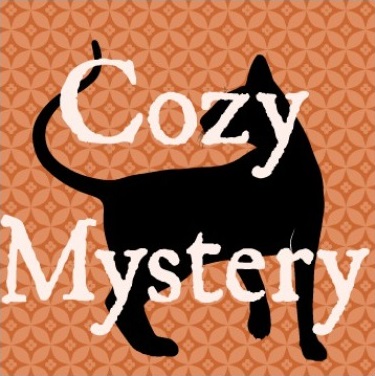

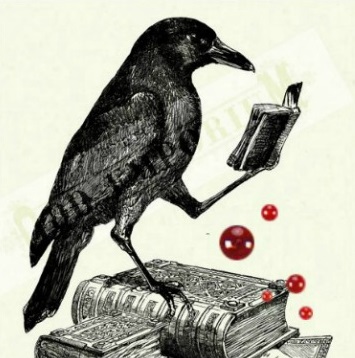







My Square Markers and "Virgin" Bingo Card:
"Virgin" card posted for ease of tracking and comparison.
![]()

Black Kitty:
Read but not called
![]()
Black Vignette:
Called but not read
![]() Black Kitty in Black Vignette:
Black Kitty in Black Vignette:
Read and Called
![]() Black Kitty Center Square:
Black Kitty Center Square:
Read = Called
Current Status of Spreadsheet:
(Note: Physical print editions unless stated otherwise)

Books Read / Listened to - Update 3:


Martin Edwards: The Story of Classic Crime in 100 Books![]()
The standout read among this batch of bingo books; a tour de force parcours through 50 years of British crime writing (from 1900 to 1950), with sidelights on authors and books published in the U.S., continental Europe, Argentina and Japan. Martin Edwards is concurrently President of the Crime Writers' Association and the Detection Club, but more importantly for present purposes, he was the Detection Club's first archivist: In my first reading status update I compared this book to what it would sound like if you get a walking encyclopedia talking, and to the print equivalent of having your favorite actor reading the phone book, but what could easily have been bone-dry in another author's hands makes for a more than compelling read in Edwards's.
Though the "100 books" (in effect, 102) chosen to exemplify the various stages and aspects of British crime writing as it emerged in the first half of the 20th century are the primary narrative vehicle, each section of the book has a short introductory chapter, and it's these in particular that make your head spin, because they're jam-packed with references to all manner of crime fiction, from the unduly forgotten to the justly remembered -- on average, no less than 20 books per chapter (and in some chapters, over 40). In fact, it is this "cramming" that ultimately made the book a tiny fraction less than a 5-star read for me: I'd either have appreciated more space to explore some of these other books at greater leisure, too, or, as this would probably have blown the book up by the hundredfold, maybe in the end less would occasionally have been more after all.
That all being said, I'm doubtlessly going to refer back to Edwards's book frequently from here on out when exploring the countless new authors, Great Detectives and series I've been introduced to, and I'm also OCD enough to have started creating reading lists here on BookLikes for all the books mentioned by Edwards (currently up to and including Chapter 15):
Other Books Mentioned:
Reading status updates:


Emily Brontë: Wuthering Heights
(Prunella Scales & Samuel West audio)![]()
It's with no small amount of surprise that I find myself registering a 4 1/2 star rating and a "favorite" check for this audio recording of Emily Brontë's one and only novel.
Though I didn't have any doubts that the mother and son team of Prunella Scales and Samuel West would pull off a stellar performance (which they of course did), Wuthering Heights has so far, in my perception, always veered dangerously close to the over-the-top melodramatic, with more than an occasional foray into the very heart of that territory, which is not my line of country at all. Yet, actually hearing the bulk of the story being told by Prunella Scales in the voice of a down-to-earth Yorkshire woman -- Nelly Dean -- opened up a whole new perspective for me, and even the high drama of "I am Heathcliff", "he's more myself than I am" and "be with me always -- take any form -- drive me mad! only do not leave me in this abyss, where I cannot find you! ... I can not live without my life! I can not live without my soul!" for the first time came across as totally believable to me -- because it wasn't told in the voice of the novel's equally tempestuous author (if contemporaneous characterizations are to be believed), but rather, in the voice of a sympathetic friend and surrogate mother, who genuinely cares for the speakers and worries about them but is apt to take a step back from their outbursts and relates those outbursts more in sorrow than in anguish.
The novel's format doesn't place Mr. Lockwood's (here: Samuel West's) framework narration on nearly the same footing as that of Nelly Dean, so the bulk of the narration is Prunella Scales's, but I particularly also enjoyed the "handover" moments from the outer framework to Nelly Dean's story. They are brief enough moments of dialogue, but in this recording they "clicked" seamlessly, like perfectly matching links of a well-made chain.
So, while of all the Brontës' novels, Charlotte's Jane Eyre (which I also revisited this summer on audio) will probably always remain my favorite, I enjoyed this particular return to Wuthering Heights much more than I anticipated and will probably revisit it more often and with greater enjoyment than I initially thought.


Simon Brett: An Amateur Corpse ![]()
An actor and BBC broadcast journalist in addition to being a writer, Simon Brett is one of Martin Edwards's predecessors as President of the Detection Club. In the early 1970s he began writing a series of mysteries centering on an actor named Charles Paris; this is the fourth of these books. Paris is invited to do a "critics circle" live discussion review of an amateur theatre production of Chekhov's Seagull, but before he even gets to give his talk, the company's new leading lady (the only professional actor in their midst) is found strangled.
Given that the edition of this mystery which I own is part of a four-book omnibus including the first four installments of the series that I acquired used and dirt-cheap, I may well give this series another shot at a later time; however, this particular novel (written in 1975) hasn't aged very well and was a rather uncomfortable reminder of all the reasons why I'm really not sorry to have left the 1970s far, far behind (the part that I consciously lived through, in any event) ... I don't think the occasional whiff of staleness emanating from the pages of the book was due to its external condition alone. I was also less than enchanted with Mr. Paris's midlife crisis woes and attitude towards women and commitment, and his insufferably arrogant stance vis-à-vis amateur theatricals, however ill-informed or pretentious they may be in turn.
That being said, the writing itself is OK, the murderer's alibi was cleverly plotted, Paris's reasons for getting involved with the investigation in the first place (worry about the chief suspect under arrest, the victim's husband, who is a friend of his, and guilt over having gone along with said friend's drowning his woes in booze instead of trying to provide some more substantial support) came across as just about credible enough, and some of Paris's deductions were nicely drawn; even though the final clue was -- incredibly -- as far-fetched as it was, at the same time, telegraphed narratively from ten miles away, and the ultimate path to the solution was (literally) more a case of stumbling over it than brain work à la Hercule Poirot and Sherlock Holmes. So, as I said, I may well give the series another shot at a later point in time. It probably won't be anytime very soon, though.


The Medieval Murderers: House of Shadows![]()
The Medieval Murderers round robin series is, literally, one of those products of an idle evening at the pub -- I guess that's what you'll get when you have five authors of medieval whodunits talking shop over a pint or two (or three ...) of ale. Permanent members of the group, which itself goes by the name "Medieval Murderers", too, are Michael Jecks (another past President of the Detection Club), Bernard Knight, Philip Gooden, Ian Morson and Susanna Gregory; with Karen Maitland and C.J. Sansom having joined for individual installments of the series.
All but one Medieval Murderers books are moulded on essentially the same template, in that they follow one particular (allegedly) "doomed" or "cursed" object from the (typically: early) Middle Ages to the present day in several separate but interlinked episodes, written by the group's individual members and typically featuring their "own" individual series protagonists; the sole exception being, so far, The Deadliest Sin, which is modeled on Chaucer's Canterbury Tales -- themselves also a round robin of sorts, modeled in turn on Boccaccio's Decameron.
In House of Shadows, the series's third installment, the "object" whose journey the writers and their protagonists follow is Bermondsey Abbey, a real life monastery founded in the 11th century by Cluniac monks near the banks of the River Thames, opposite the Tower. The abbey, rich and influential in the Middle Ages, was dissolved under Henry VIII and subequently repeatedly built over; it seems to have been the abbey ruins' excavation in the early 2000s -- in the course of the construction of a huge shopping and office complex now forming part of the newly- and substantially-gentrified Bermondsey and Southwark shoreline -- that apparently inspired the premise and opening chapter(s) of House of Shadows. The authors do go to some lenghts to assure the reader, however, that the events placing a curse on the abbey at the beginning of this book are fictitious (as are the plotlines of the subsequent chapters), and though not inconceivable in the so-called "Dark Ages", it would indeed be shocking for a medieval house of God to have been carrying such a terrible legacy.
While the individual chapters' storylines are thus fictitious, again as in many Medieval Murderers books, real, documented historic persons are used in the stories alongside fictitious characters, and the research into details of social and geographical history is solid. Also as with virtually all round robin efforts (not just by this particular group), the writerly approach varies both in style and in quality, and this installment of the Medieval Murderers series does not necessarily show all of the participants at the top of their game. Still, it's enjoyable enough, some of the chapters really are a delight to read, and once more as is so frequently the case, the sum total is decidedly more than its constituent parts.


Sketches of medieval Bermondsey Abbey
(Sources: Wikipedia (top) and South London Guide (bottom))
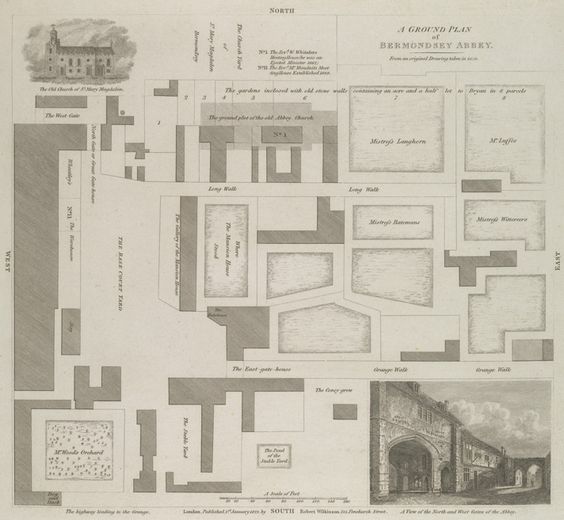
Bermondsey Abbey ground plan (source: British Library)

Marcus Gheeraerts the Elder (attr. -- formerly attr. John Hofnagel): A Fête at Bermondsey (Source: Wikimedia Commons)

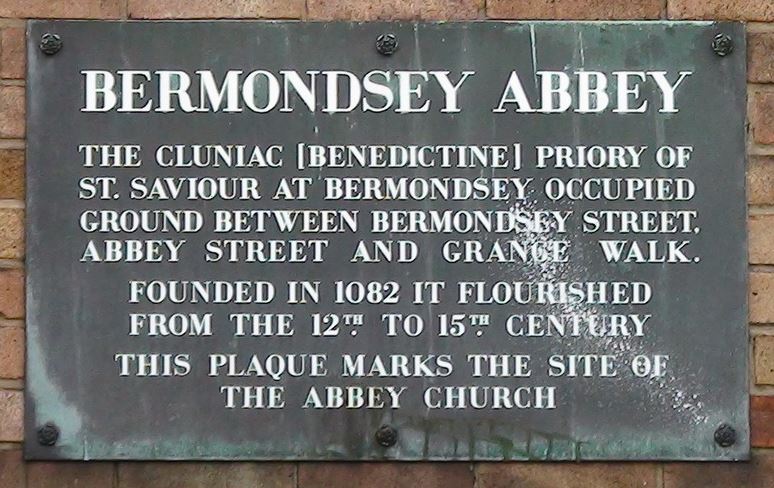
Bermondsey Abbey excavations and memorial plaque
(sources: Wikipedia (left) and London Remembers (right))
The sacred taper's lights are gone,
Grey moss has clad the altar-stone,
The holy image is o'erthrown,
The bell has ceased to toll:
The long-ribb'd aisles are burst and shrunk,
The holy shrine to ruin sunk,
Departed is the pious monk;
God's blessing on his soul!"
Sir Walter Scott: Bermondsey
Bermondsey Abbey history and excavation (YouTube)

Bermondsey shoreline today (photo mine)


Shirley Jackson: We Have Always Lived in the Castle
(Bernadette Dunne audio)![]()
Terrifying women all around with this one -- Shirley Jackson delivers every single time when it comes to sheer psychology-based horror (and so, for that matter, do her characters). You're barely ten minutes into the story, and you're already supremely uneasy -- and boy, does this ever have a slow, peeling-away-layer-by-layer burn ending in a gigantic dynamite fuse. There's no way to write about this book without instantly giving away spoilers, so I ... just won't, even though most people here are probably already familiar with the story anyway. Truly masterful storytelling, in any event; truly unsettling social commentary and, in the audio version I own, also truly masterfully rendered by Bernadette Dunne. I started listening to this one night when I really should have gone to bed much earlier -- and ended up finishing the complete audio in a single sitting; there was no way I could have stopped, even though ultimately it was solely due to my being crash-and-knocked-out tired from entirely unrelated RL excertions that I was able to sleep afterwards at all.
And finally:

... an audiobook extravaganza, though in the case of the Edgar Allan Poe, Ngaio Marsh and Agatha Christie books (see below), I do own paper copies of the respective novels, too, and had read them before; this was strictly in the spirit of revisiting them in a different medium. (Hah. So much for "I'm going to use this square to do something about those books on my mystery TBR that I can't fit into any other bingo square, because clearly something needs to be done about reducing that stack" ...)
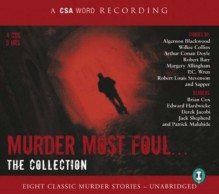
![]()
To start off -- well, let's be honest, how could I possibly not use an audio collection entitled Murder Most Foul for this particular square?!
This is a collection of eight short stories by different authors, read with great aplomb by five well-known British actors. It starts of with Bluebeard's Bath by Margery Allingham -- read by Patrick Malahide --, a "non-Campion" twist on the black widow trope (the twist being, as the title implies, that here it's a black widower), which derives most of its suspense from the fact that it is told from the murderer's perspective. -- 4 1/2 stars for this story individually; it's one of the strongest of this lot.
Next is Wilkie Collins's Who Killed Zebedee? (read by Derek Jacobi), which concerns the death of a lodger in an apartment house, and a would-be accidental amateur sleuth's attempt to clear the woman with whom he is infatuated from the suspicion of murder. (3 stars, individually -- Collins himself could do better, and the story doesn't really measure up to the rest of this collection, either.)
The third story is An Alpine Divorce by Robert Barr (read by Brian Cox), where a married couple that has come to secretly hate each other's guts vacations in the Alps ... with starkly differing notions as to how those vacations are supposed to end, and with a deliciously-executed evil final twist. -- Easily 4 stars.
Barr's story is followed by Edward Hardwicke's reading of Arthur Conan Doyle's The Speckled Band: Although overall I prefer the Derek Jacobi and Stephen Fry readings of the Holmes canon, it's always a true pleasure, too, to have a story narrated by the actor who was Watson to Jeremy Brett's Holmes for the better part of my personal "Sherlock Holmes to end all Sherlock Holmes" series, and certainly nobody nails Holmes's occasionally strident tone as well as the man who was at the receiving end of that very tone for a considerable amount of time (even though in real life Brett and Hardwicke got along like a house on fire, and when Brett's illness reared its ugly head, Hardwicke was the first to be protective of him). -- I already own several collections of Sherlock Holmes stories read by Hardwicke, and this reading nicely complements those collections. (5 stars -- this is a stand-out even in Conan Doyle's amazing body of work.)
The next story is probably my favorite of the lot -- next to the Holmes entry, obviously, and with Allingham's offering not far behind: P.C. Wren's The Perfect Crime (read, again, by Brian Cox), which is based on the explicit premise that yes, "there is in fact such a thing as the perfect crime: I know, because I have committed one." As in Allingham's story, the chief element of suspense is derived from the fact that the story is told strictly from the murderer's perspective, and again similar to Allingham's story, the plot is constructed so as to slowly and deliciously peel away layer by layer, with a slow burn that ends in a supremely devious final twist. -- 5 solid stars as well.
The final three stories (like Wilkie Collins's) are made of weaker stuff than the three highlighted above in particular:
Sapper's Thirteen Lead Soldiers (again read by Edward Hardwicke) is a story from the "Bulldog Drummond" canon whose crucial twist turns, as the title implies, on a collection of toy soldiers that one participant of a secret meeting of high-ranking international diplomats (to which Drummond has been invited at Scotland Yard's suggestion in an effort to highten security) has made for and gifted to the hosting nobleman's son. This is both a "whodunit" and a "howdunit" -- where Drummond manages to foil the murderer's intentions to rather lasting effect -- and though I didn't care enough to try and unravel every last detail of the solution in advance, both "whodunit" and the basic outline of "howdunit" are fairly easy to work out. (3 1/2 stars, individually.)
Algernon Blackwood's First Hate (read by Derek Jacobi) is based on the contention that, just as there is such a thing as love at first sight, there is also such a thing as purely instinctive "hate at first sight" -- quod erat demonstrandum by way of an "around the fireplace" narration of just such an encounter, with a competition for the hand of a woman thrown in as a sideline (or as a more plausible motive? I couldn't make up my mind which was which, and ultimately didn't care), and with an ending high up in the Canadian Rockies -- where the story moves from its London beginnings -- that for all practical purposes amounts to cold-blooded murder dressed up as self-defense ... unless you buy into the central premise, which I manifestly don't. (Jacobi doesn't seem to, either; this is definitely not one of his most convincing narrations, and coming from someone who'd willingly listen to him reciting the phone book, that should tell you something in and of itself.) -- 2 1/2 stars, because I'm feeling generous and because Blackwood still knows how to tell a story, even if it's a supremely implausible one. Also, um, Derek Jacobi.
Finally, Robert Louis Stevenson's Markheim (read by Jack Shepherd) is highly atmospheric and skillfully constructed until about its halfway point (or shortly thereafter): It starts with a customer's (the eponymous Markheim's) visit to a pawnbroker's store on Christmas Eve and the exchange between the customer and the pawnbroker, which after a short while ends in murder. There's a nice, slow build-up to the murder itself (which build-up even includes an adroitly-executed slight of hand), and a further slow burn while the murderer is rifling the shop and trying to cover his tracks. However, then we literally get a deus ex machina appearance that radically changes the state of play, and unfortunately that was the point where Stevenson lost me. -- 3 1/2 stars, chiefly for the story's first part; a writer of Stevenson's caliber shouldn't have needed (or even explicitly sought) any deus ex machina, and certainly not this one; not even in a story set on Christmas Eve.
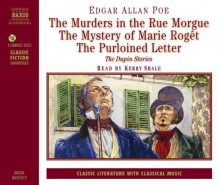 Edgar Allan Poe: The Dupin Stories -- The Murders in the Rue Morgue / The Mystery of Marie Rogêt / The Purloined Letter
Edgar Allan Poe: The Dupin Stories -- The Murders in the Rue Morgue / The Mystery of Marie Rogêt / The Purloined Letter
(Kerry Shale audio)![]()
I debated using this for either the "Locked Room" or the "Classic Horror" bingo square, but there was compelling competition for both of those, and anyway, I already knew the stories and chiefly bought this CD for Kerry Shale's narration: Ever since I first listenend to his audio versions of Christopher Paolini's Inheritance cycle, I've been on the lookout for further recordings featuring him.
Edgar Allan Poe is credited with having created the first professional detective in C. Auguste Dupin -- a fact that, unsurprisingly, doesn't go down particularly well with Sherlock Holmes when mentioned to him by Dr. Watson -- and in fact, Dupin and Holmes share a number of traits and abilities, including their disdain (benevolent or not) for the professional police, their reliance on "trifles" (apparently unimportant details), and their rather astonishing ability to deduct another person's silent thoughts by "reasoning backwards" and then thoroughly startle the other person by responding to those very thoughts explicitly. But while Arthur Conan Doyle's Sherlock Holmes stories rely on Holmes's fully-rounded character, as well as on action and plot development, as much as on Holmes's deductive methods, and while they invite the reader along on the investigation, Poe's "stories of ratiocination" -- once Dupin has been (or considers himself) called on to help solve the case -- are almost exclusively a rendition of Dupin's own thought processes and reasoning. This, to me, makes them somewhat more monotonous and consequently somewhat less easy to follow (even with a splendid narrator like Kerry Shale).
The Murders in the Rue Morgue is one of the earliest locked room mysteries in the history of crime fiction, and together with the even earlier Mademoiselle Scuderi by E.T.A. Hoffmann (which however is more "impossible crime" story than locked room mystery in the strict sense), and with Gaston Leroux's Mystery of the Yellow Room, it pretty much laid down the template for this particular mystery subgenre. Its solution is as, um, colorful as some of Dupin's conclusions, however, and it requires a healthy portion of suspension of disbelief -- here, too, both Conan Doyle and Leroux did better, and so did E.T.A. Hoffmann.
The Mystery of Marie Rogêt was Poe's response to a widely-publicized real life murder case in New York: Poe transposed the events to Paris and, through the voice of his fictional detective, set forth what he believed to be the solution of the case; disecting, in the process, the various competing theories advanced by the newspapers writing about the murder -- the only material that Poe himself had to go on. (Despite its notoriety and the public hunt for the killer, the real life case of the murder of Mary Rogers still remains unsolved.)
The Purloined Letter is easily my favorite among the three Dupin stories: Like his famous London colleague frequently half a century later, our Paris detective is called on by a high government official (the Prefect of Police) with a request to assist in recovering a document which, in the wrong hands, might wreak all sorts of political havoc. The solution to the case relies on both a rather brazen attitude by the culprit, which Dupin divines, and on an oversight that, I very much hope and trust, should not happen to any well-organized modern police force. Dupin's deductive process is sound and fun to watch, however, and we're also invited in on a bit more of the chase than in the other stories.
 Agatha Christie: Endless Night
Agatha Christie: Endless Night
(BBC full cast dramatization)![]()
I said not so long ago that (barring Christie's overwhelmingly abysmal final books) Enless Night isn't exactly my favorite book by her and that I probably wouldn't revisit it anytime soon -- then this CD crossed my path for a song during a recent book store browse, and I figured it had to be karma, so here we are after all.
I'm still not exactly enchanted with the story (let alone its narrator and protagonist), though, and if there is one thing that this audio adaptation makes clear it is that this is a story that does not easily lend itself to the transformation to another medium -- too subtle, nuanced and slow is the burn up to the final climax. That said, the adaptation's cast handles the material very well, and the script avoids the pitfalls that some of the novel's incidental elements would undoubtedly create in less expert hands. So, if you just want to know what happens in this novel, this is a decent enough introduction -- just don't expect the depth of the written original.
 Dick Francis: Knockdown (Tim Pigott-Smith audio)
Dick Francis: Knockdown (Tim Pigott-Smith audio)![]()
I love horses and used to be an enthusiastic horseback rider throughout my entire school years, and I also love mysteries, so Dick Francis's books were a natural go-to choice for me once upon a time. Having revisited a Dick Francis novel after many years, though, I find that this, too, hasn't weathered the passage of time particularly well, even though it's still a pleasure to go horse trading with Mr. Francis and have him share his experience of life on and off the racetrack -- and Mr. Pigott-Smith is another audio narrator who has once more solidified his hold on my attention.
Knockdown is the story of Jonah Dereham, an ex-steeplechase jockey turned bloodstock agent who gets into trouble when he takes a stance against a de-facto syndicate exploiting a gap in the rules of trading for purposes of profiteering at their clients' (the horse owners' and breeders') epxense. The book doesn't start out as a murder mystery -- there's plenty of assault and battery, arson, and other assorted violent behaviour (as well as, obviously, greed, extortion and [near-]fraudulent machinations), but the murders -- several of them in quick succession -- only happen once the profiteering racket's chief organizer is beginning to feel the hounds closing in on him, with Jonah at their forefront.
Ngaio Marsh:
Artists in Crime (Benedict Cumberbatch audio)
![]() Overture to Death (Anton Lesser audio)
Overture to Death (Anton Lesser audio)
![]()
Death and the Dancing Footman (Anton Lesser audio)![]()
Surfet of Lampreys (Anton Lesser audio)
![]() Opening Night (aka Night at the Vulcan) (Anton Lesser audio)
Opening Night (aka Night at the Vulcan) (Anton Lesser audio)
![]()
Finally, my audio extravaganza consisted of a five-volume foray into Ngaio Marsh's Roderick Alleyn series, next to Agatha Christie's, Dorothy Sayers's, Margery Allingham's and Patricia Wentworth's one of the major Great Detective series of the Golden Age; taken together, these five writers are unquestionably the era's "Queens of Crime." (I own print versions of all of Marsh's novels, too, and pulled those in addition to the audio recordings.)
Of the five novels revisited, Death and the Dancing Footman had previously been my favorite novel and it continues to be so; it's a slightly wacky country house locked-room mystery (so would also fit these two squares) where a group of guests with previously-existing antagonisms are invited to a house party ... with predictable effects; and it certainly doesn't help that the house is snowed in and thus locked off from its surroundings.
Death and the Dancing Footman is an intra-series sequel of sorts to Overture to Death, which is set in the village closest to the manor where Death and the Dancing Footman is set in turn, with the vicar from Overture to Death briefly making a reappearance as Alleyn's and his wife's host in Death and the Dancing Footman.
Marsh's writing particularly shines where it focuses on characterization, and there are two settings -- in addition to country house mysteries -- ideally suited for this: village settings and the theatre. Overture to Death is a nice example of the former, Opening Night (published as Night at the Vulcan in the U.S.) of the latter. In Overture to Death, village jealousies and intrigues culminate in a rather cleverly-constructed "murder by piano" (with a built-in service revolver) on the day of the opening of the local amateur theatricals' latest production. -- Opening Night is set in London's West End, at the (fictitious) Vulcan Theatre (which had already been the setting of Marsh's second Alleyn novel, Enter a Murderer); and it concerns the "death by greasepaint" of an actor who has made one enemy to many in a cast of bickering performers, also inclduing an idiosyncratic and irrascible playwright. The actor manager of the Vulcan is rather obviously modeled on Laurence Olivier -- and he is not the only leading actor appearing in Marsh's novels with whom that is the case. As Marsh herself was, first and foremost, a highly-reputed theatrical director who had built an especially solid reputation for her productions of the plays of William Shakespeare, this particular milieu was second nature to her, and consequently her portrayals of actors and the world of the theatre are a special delight to read -- and a character's aptitude at quoting Shakespeare is a near-infallible indication that he is likely one of the "good guys." (Obviously, Alleyn himself speaks Shakespeare fluently.)
Opening Night is, again (and very losely speaking), an intra-series sequel of sorts to Surfeit of Lampreys (in the U.S., published as Death of a Peer), where the death of the wealthy Lamprey family patriarch brings Alleyn into an investigative encounter with the dead peer's quirky, chronically impoverished family -- one of whose sons, as a result of the encounter, eventually seeks employment with the Metropolitan Police and returns as P.C. Lamprey in the later novel.
Artists in Crime, finally, is the novel where Alleyn meets his wife-to-be, the feisty, self-assured painter Agatha Troy. Again, as Marsh (in addition to being a director and writer) was also a trained painter she could speak from experience when writing about Troy, who would become one of the series's greatest assets and a great complement to "the nice detective" Roderick Alleyn.
Of the audio versions I listened to, I preferred those read by Anton Lesser to the one by Benedict Cumberbatch: While Lesser clearly knew and appreciated the material, Cumberbatch did bring his considerable talent to bear, but it was rather obviously "just a job" to him and he knew nothing about the series. This showed most obviously in his pronunciation of Alleyn's name: Ngaio Marsh had named her inspector for Elizabethan actor Edward "Ned" Alleyn, the star of the Lord Admiral's Men (the chief competitors of William Shakespeare's King's Men), whose name was pronounced ALLen -- and Marsh was adamant that this was how her inspector's name was to be pronounced as well. Anton Lesser knew and respected that -- Cumberbatch didn't, and to a fan of the series, it was seriously jarring to hear him saying All-EYN over and over again, particularly given the frequency with which the name appears.
Next Reads:


and


Angua!!
Books Read / Listened to - Update 1:


![]()
Terry Pratchett: Equal Rites


![]()
Wilkie Collins: Mrs. Zant and the Ghost
(Gillian Anderson audio)


![]()
Martin Edwards / British Library:
Miraculous Mysteries - Locked-Room Murders and Impossible Crimes


![]()
Agatha Christie: Mrs. McGinty's Dead
(Hugh Fraser audio)
Books Read / Listened to - Update 2:


![]()
Donna Andrews: Lord of the Wings




Ruth Rendell:
The Babes in the Wood![]()
& Not in the Flesh
![]()


Robert Louis Stevenson: Dr. Jekyll & Mr. Hyde

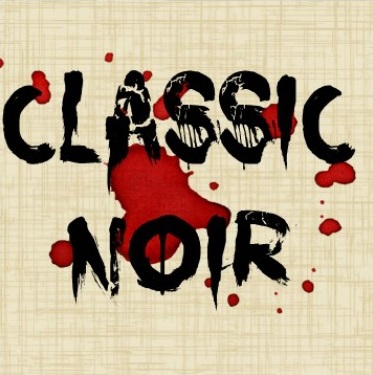



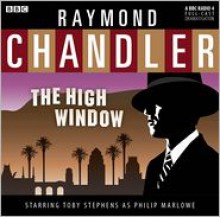
Cornell Woolrich: The Bride Wore Black
![]()
Raymond Chandler:
Farewell, My Lovely

The Long Goodbye![]()
The High Window![]()
The Book Pool:

Most likely: Donna Andrews: Lord of the Wings
Alternatively:
* Diane Mott Davidson: Catering to Nobody
* One or more stories from Martin Greenberg's and Ed Gorman's (eds.) Cat Crimes
* ... or something by Lilian Jackson Braun

Most likely: Emily Brontë: Wuthering Heights
(audio return visit courtesy of either Michael Kitchen or Prunella Scales and Samuel West)
Alternatively:
* Wilkie Collins: The Woman In White
(audio version read by Nigel Anthony and Susan Jameson)
* Jane Austen: Northanger Abbey
(audio return visit courtesy of Anna Massey)
* Isak Dinesen: Seven Gothic Tales
* Carol Goodman: The Lake of Dead Languages
* ... or something by Daphne du Maurier
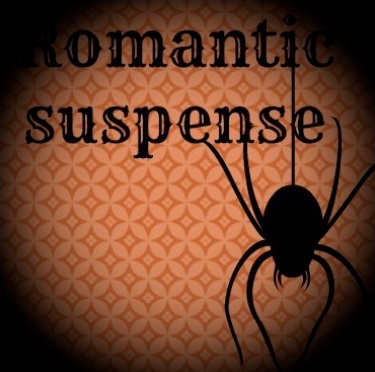 Candace Robb: The Apothecary Rose
Candace Robb: The Apothecary Rose
 Most likely: Simon Brett: A book from a four-novel omibus edition including An Amateur Corpse, Star Trap, So Much Blood, and Cast, in Order of Disappearance
Most likely: Simon Brett: A book from a four-novel omibus edition including An Amateur Corpse, Star Trap, So Much Blood, and Cast, in Order of Disappearance
Alternatively:
* Georgette Heyer: Why Shoot a Butler?
* Margery Allingham: The Crime at Black Dudley
(audio version read by David Thorpe)
* Carol Goodman: The Lake of Dead Languages
* Minette Walters: The Shape of Snakes
 Most likely: Something from James D. Doss's Charlie Moon series (one of my great discoveries from last year's bingo)
Most likely: Something from James D. Doss's Charlie Moon series (one of my great discoveries from last year's bingo)
Or one of Walter Mosley's Easy Rawlins mysteries
Alternatively:
Sherman Alexie: Indian Killer
 Terry Pratchett: Carpe Jugulum
Terry Pratchett: Carpe Jugulum
 One or more stories from Martin Edwards's (ed.) and the British Library's Miraculous Mysteries: Locked-Room Murders and Impossible Crimes
One or more stories from Martin Edwards's (ed.) and the British Library's Miraculous Mysteries: Locked-Room Murders and Impossible Crimes
 Most likely: Agatha Christie: Mrs. McGinty's Dead
Most likely: Agatha Christie: Mrs. McGinty's Dead
(audio return visit courtesy of Hugh Fraser)
Or one or more stories from Martin Edwards's (ed.) and the British Library's Serpents in Eden: Countryside Crimes
Alternatively:
* Carol Goodman: The Lake of Dead Languages
* Josephine Tey: Brat Farrar, To Love and Be Wise, or The Singing Sands
* Georgette Heyer: Why Shoot a Butler?
* Peter May: The Lewis Man
* S.D. Sykes: Plague Land
* Arthur Conan Doyle: The Mystery of Cloomber
* Michael Jecks: The Devil's Acolyte
* Stephen Booth: Dancing with the Virgins
* Karen Maitland: The Owl Killers
* Martha Grimes: The End of the Pier
* Minette Walters: The Breaker
 One of two "Joker" Squares:
One of two "Joker" Squares:
To be filled in as my whimsy takes me (with apologies to Dorothy L. Sayers), either with one of the other mystery squares' alternate books, or with a murder mystery that doesn't meet any of the more specific squares' requirements. In going through my shelves, I found to my shame that I own several bingo cards' worth of books that would fill this square alone, some of them bought years ago ... clearly something needs to be done about that, even if it's one book at a time!
 Isabel Allende: Cuentos de Eva Luna (The Stories of Eva Luna) or
Isabel Allende: Cuentos de Eva Luna (The Stories of Eva Luna) or
Gabriel García Márquez: Crónica de una muerte anunciada (Chronicle of a Death Foretold)
 Most likely: One or more stories from Charles Dickens: Complete Ghost Stories or
Most likely: One or more stories from Charles Dickens: Complete Ghost Stories or
Sharyn McCrumb: She Walks These Hills
Alternatively:
* Wilkie Collins: Mrs. Zant and the Ghost
(Gillian Anderson audio)
* Stephen King: Bag of Bones
 Terry Pratchett: Men at Arms
Terry Pratchett: Men at Arms

Obviously and as per definition in the rules, the second "Joker" Square.
Equally as per definition, the possibles for this square also include my alternate reads for the non-mystery squares.

Most likely: Cornell Woolrich: The Bride Wore Black
Alternatively:
* Raymond Chandler: Farewell My Lovely or The Long Goodbye / The High Window
* James M. Cain: Mildred Pierce
* Horace McCoy: They Shoot Horses, Don't They?
* David Goodis: Shoot the Piano Player or Dark Passage
* ... or something else by Cornell Woolrich, e.g., Phantom Lady or I Married a Dead Man
 Most likely: Ruth Rendell: Not in the Flesh or The Babes in the Wood (audio versions read by Christopher Ravenscroft, aka Inspector Burden in the TV series)
Most likely: Ruth Rendell: Not in the Flesh or The Babes in the Wood (audio versions read by Christopher Ravenscroft, aka Inspector Burden in the TV series)
Alternatively:
* Carol Goodman: The Lake of Dead Languages
* Sharyn McCrumb: She Walks These Hills

Most likely: Peter May: Coffin Road
Alternatively:
* Stephen King: Bag of Bones or Hearts in Atlantis
* Denise Mina: Field of Blood
* Carol Goodman: The Lake of Dead Languages
* Minette Walters: The Breaker
* Jonathan Kellerman: When The Bough Breaks, Time Bomb, Blood Test, or Billy Straight
* Greg Iles: 24 Hours

Most likely: Sharyn McCrumb: She Walks These Hills
Alternatively:
* Karen Maitland: The Owl Killers
* Greg Iles: Sleep No More
 Most likely: Margery Allingham: The Crime at Black Dudley
Most likely: Margery Allingham: The Crime at Black Dudley
(audio version read by David Thorpe)
Alternatively:
* One or more stories from Martin Edwards's (ed.) and the British Library's Murder at the Manor: Country House Mysteries
* Georgette Heyer: They Found Him Dead
* Ellis Peters: Black is the Colour of My True-Love's Heart

Most likely: Something from Terry Pratchett's Discworld / Witches subseries -- either Equal Rites or Maskerade
Alternatively:
* Karen Maitland: The Owl Killers
* Shirley Jackson: The Witchcraft of Salem Village
 Most likely: Antonia Hodgson: The Devil in the Marshalsea
Most likely: Antonia Hodgson: The Devil in the Marshalsea
Alternatively:
* Rory Clements: Martyr
* Philip Gooden: Sleep of Death
* Minette Walters: The Shape of Snakes
* Ngaio Marsh: Death in Ecstasy
* One or more stories from Martin Edwards's (ed.) and the British Library's Capital Crimes: London Mysteries
 Most likely: Robert Louis Stevenson: The Strange Case of Dr. Jekyll and Mr. Hyde
Most likely: Robert Louis Stevenson: The Strange Case of Dr. Jekyll and Mr. Hyde
(audio return visit courtesy of Sir Christopher Lee)
Alternatively:
* H.G. Wells: The Island of Dr. Moreau
* ... or something by Edgar Allan Poe
 Most likely: Something from Ovid's Metamorphoses
Most likely: Something from Ovid's Metamorphoses
Alternatively:
* Robert Louis Stevenson: The Bottle Imp
* Christina Rossetti: Goblin Market
* H.G. Wells: The Island of Dr. Moreau

Most likely: Jo Nesbø: The Snowman
Alternatively:
* Val McDermid: The Retribution
* Denise Mina: Sanctum
* Mo Hayder: Birdman
* Caleb Carr: The Alienist
* Jonathan Kellerman: The Butcher's Theater
* Greg Iles: Mortal Fear

Most likely: The Medieval Murderers: House of Shadows
or Hill of Bones
Alternatively:
* Sharyn McCrumb: She Walks These Hills
* Shirley Jackson: The Haunting of Hill House
* Stephen King: Bag of Bones
* Carol Goodman: The Lake of Dead Languages
* Michael Jecks: The Devil's Acolyte

Ooohhh, you know -- something by Shirley Jackson ... if I don't wimp out in the end; otherwise something by Daphne du Maurier.
















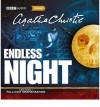


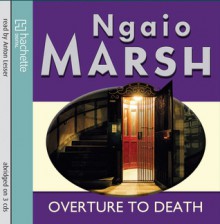

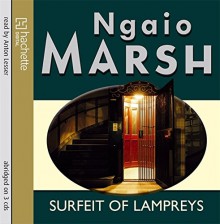





 8
8  8
8 